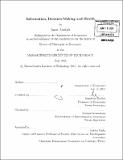| dc.contributor.advisor | Jonathan Gruber and Michael Greenstone. | en_US |
| dc.contributor.author | Abaluck, Jason T | en_US |
| dc.contributor.other | Massachusetts Institute of Technology. Dept. of Economics. | en_US |
| dc.date.accessioned | 2011-08-30T15:40:41Z | |
| dc.date.available | 2011-08-30T15:40:41Z | |
| dc.date.copyright | 2011 | en_US |
| dc.date.issued | 2011 | en_US |
| dc.identifier.uri | http://hdl.handle.net/1721.1/65482 | |
| dc.description | Thesis (Ph. D.)--Massachusetts Institute of Technology, Dept. of Economics, 2011. | en_US |
| dc.description | Cataloged from PDF version of thesis. | en_US |
| dc.description | Includes bibliographical references (p. 151-155). | en_US |
| dc.description.abstract | This thesis consists of three essays on information, decision-making and health. All three concern the relationship between the choices consumers would make if they were "fully informed" in an appropriate sense and the choices we actually observe. Chapter 1 considers how we can determine whether consumers are appropriately taking into account health information when they make their food consumption decisions. The fundamental idea is to determine the value of a statistical life (VSL) implicit in food consumption decisions and to compare this value with previous estimates of the VSL. The main positive result is that the VSL estimated from food consumption is about 1/10th as large as estimates from other contexts. I also consider the normative implications under the assumption that VSL estimates from other contexts indicate how individuals would behave if they were "fully informed" and discuss what additional evidence might support such an assumption. Chapter 2, co-authored with Jonathan Gruber, performs an analogous exercise in the case of health care plans. Where Chapter 1 makes the normative assumption that consumers should value years of life equally regardless of where they come from (e.g. eating healthier foods or reducing risk of on-the-job death), Chapter 2 makes the normative assumption that consumers should value a dollar of cost savings equivalently whether it comes through premiums or out of pocket costs. This restriction can then be used to evaluate whether consumers are choosing appropriately. The chapter studies this question in the context of Medicare Part D Prescription Drug Plan, the most significant privatization of the delivery of a public insurance benefit in recent history. Chapter 3 attempts to consider the circumstances in which the partial equilibrium welfare analyses performed in parts 1 and 2 extend to a general equilibrium setting in which prices and product characteristics respond endogenously to changes in demand. In particular, Chapter 3 derives conditions under which more information leads to welfare gains in general equilibrium taking into account the endogenous response of firms' pricing and product quality decisions. | en_US |
| dc.description.statementofresponsibility | by Jason Abaluck. | en_US |
| dc.format.extent | 155 p. | en_US |
| dc.language.iso | eng | en_US |
| dc.publisher | Massachusetts Institute of Technology | en_US |
| dc.rights | M.I.T. theses are protected by
copyright. They may be viewed from this source for any purpose, but
reproduction or distribution in any format is prohibited without written
permission. See provided URL for inquiries about permission. | en_US |
| dc.rights.uri | http://dspace.mit.edu/handle/1721.1/7582 | en_US |
| dc.subject | Economics. | en_US |
| dc.title | Information, decision-making and health | en_US |
| dc.type | Thesis | en_US |
| dc.description.degree | Ph.D. | en_US |
| dc.contributor.department | Massachusetts Institute of Technology. Department of Economics | |
| dc.identifier.oclc | 746572688 | en_US |
